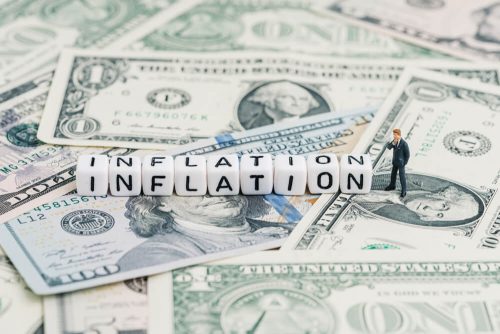Rising inflation continues to dominate headlines at home and around the world. There is simply no getting around the fact that prices for rent, groceries, gas, and other everyday essentials continue to rise and break records.
As our wallets feel the squeeze at the grocery store and the gas pump, it’s easy to be misled by pundits providing convenient scapegoats like a “red-hot labor market” and rising wages. They say that because unemployment is so low, workers have had the upper hand over employers, increased their wages, and contributed to inflation. Yesterday, the Federal Reserve seemed to follow this line of thinking in its decision to slow the economy down by raising interest rates by half a percentage point.
Needless to say, the problem with our economy is not actually that working people are making too much money. Instead, to find the real culprit for inflation, look no further than corporate greed. As we’ve outlined in the past, corporations have used the cover of pandemic-related global supply chain issues to raise prices over and above what would be necessary to make up for increased production costs, fanning the flames of inflation.
This week, we’re shining a spotlight on the real causes of inflation and what the real solutions should be: taxes.
Corporate profits have contributed disproportionately to inflation. How should policymakers respond? by Josh Bivens
In a new report for the Economic Policy Institute, Josh Bivens analyzed pricing data to better understand what’s really driving inflation. What he found was stunning – over half (53.9%) of the increase in consumer prices is attributable to fatter corporate profits. Higher labor costs, on the other hand, explain just 7.9% of recent inflation. This throws the mainstream economist blame game for inflation – the “red-hot labor market” and ensuing higher labor costs – out the window.
I Listened In on Big Business. It’s Profiting from Inflation, and You’re Paying for It. by Lindsay Owens
You might think that corporations would be coy about the fact that they are using the cover of inflation to engage in profiteering. Think again! Lindsay Owens and her team at the Groundwork Collaborative listened in on hundreds of earnings calls between companies and their shareholders and found that executives have been openly bragging about their price-gouging strategies. It’s true that companies have suffered from pandemic-related global supply chain issues, but they’ve used this and the general hype over inflation as cover to raise prices over and above what would be necessary to make up for increased production costs. It’s no wonder then that corporate profits are at a 70-year high.
Inflation is at a 40-year high. The Fed announced these aggressive moves to fight it by Paul Davidson
Yesterday, the Federal Reserve announced that it would raise its key short-term interest rate by half a percentage point – its largest hike since 2000 – in an effort to slow down an “overheated” economy and fight inflation. While this may be the “standard” solution for inflation, it’s not going to do anything to tackle the corporate greed and profiteering that is driving it. What it does do, however, is make it more expensive for regular Americans to borrow money, a decision that will hurt, not help, those already bearing the brunt of inflation.
When inflation is high, Warren Buffett says the best thing you can do is ‘be exceptionally good at something’ by Nicolas Vega
In yet another reminder that the billionaires who are profiting the most from the way our economy is currently structured are out of touch, Warren Buffett recently told investors at a 2022 Berkshire Hathaway shareholders meeting that the best way to protect yourself against inflation is to sharpen your skills and “be exceptionally good at something.” If Buffett is trying to imply that he believes that fighting inflation amounts to nothing more than a personal responsibility, we wholeheartedly disagree. Fighting inflation is a collective responsibility and, in order to effectively tackle it, we need to put pressure on lawmakers to tax corporations and their excess profits.
